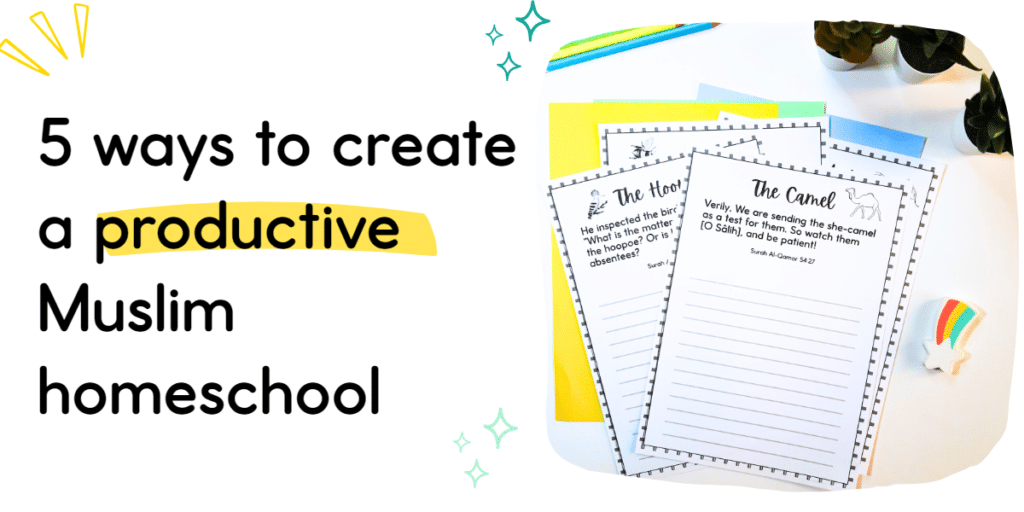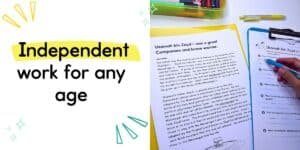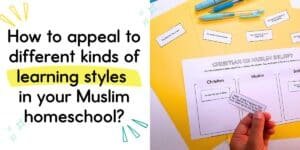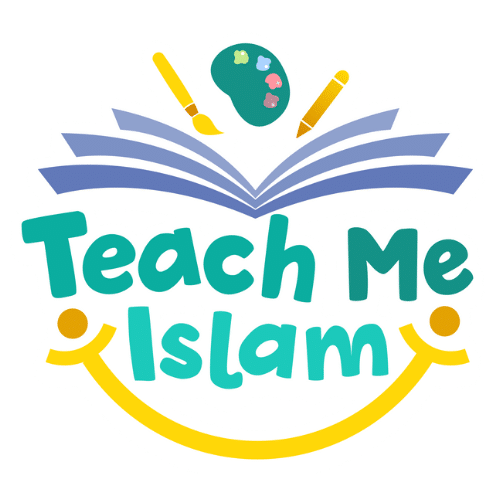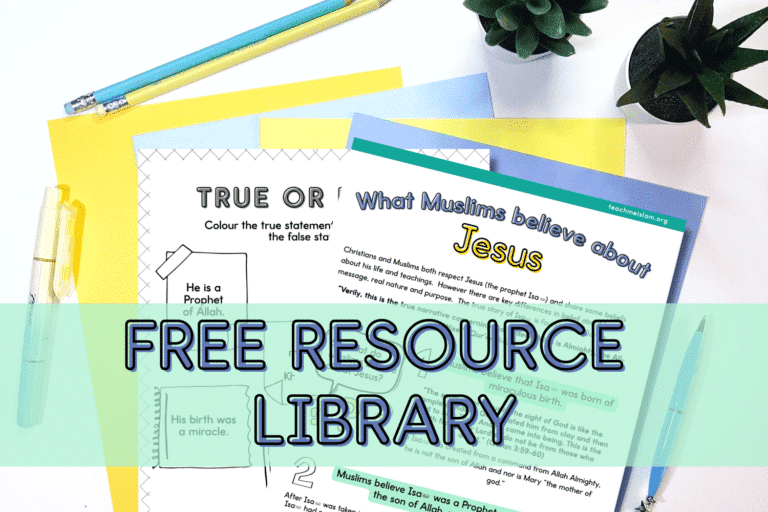Do you ever feel short on time? Do you wish you had a more productive Muslim homeschool? Your homeschool to-do list is a mile long, let alone the household duties and general life! If you feel as if you are never getting everything done and are falling behind, it can be hugely demotivating. This lack of enthusiasm can affect your whole homeschool, creating a spiral that leads nowhere good. The simplest way to reverse this is to actually hit your key learning objectives bithnillah. The feeling of progress is hugely motivating which in turn, creates the positive momentum we all hope for in our Muslim homeschools.
Here are five ways you can make better use of your time, increase productivity, and maybe, just maybe, have time to drink a cup of tea before it gets cold inshaAllah.
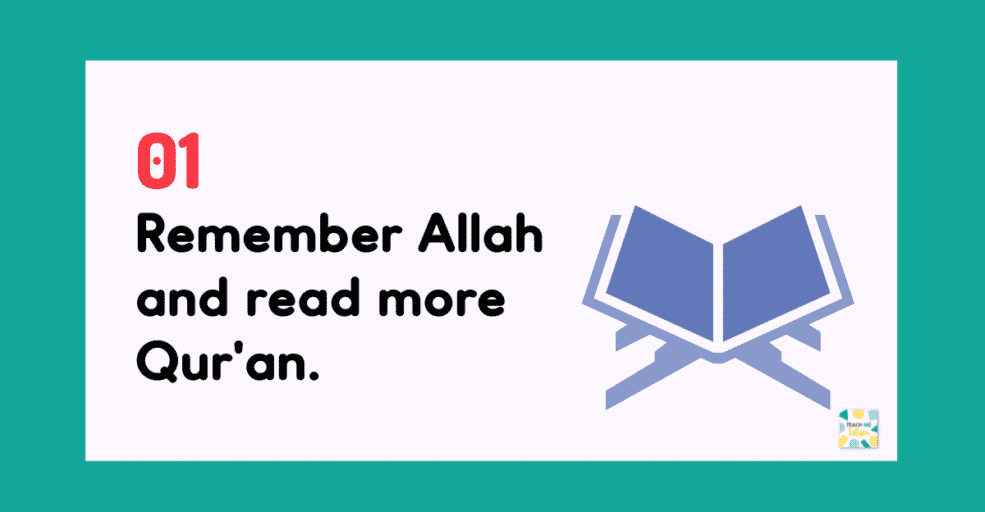
Remember Allah and read more Qur’an for a productive Muslim homeschool
We don’t need more hours in our day, we need more barakah in our time. The morning and evening athkaar, du’aa for barakah, and remembering Allah before all our actions are the way to success in our Muslim homeschools, our general lives, and in the aakirah.
One of the Salaf (righteous predecessors) said: “Whenever my portion of reciting the Qur’an would increase, the Barakah (blessings) in my time would increase. And I would not cease increasing in reciting until the amount of my recitation reached ten Juz.”
And Ibrahim ibn ‘Abdul-Wahid Al-Maqdisi said to Ad-Diyaa’ Al-Maqdisi when he (Ad-Diyaa’) was about to go on a journey in search of knowledge, advising him: “Increase in the recitation of the Qur’an and don’t leave it, for that what you are trying to achieve will be easier in proportion to what you are reciting.”
Ad-Diyaa’ said: “So then I actually noticed that and tried it out a lot, hence whenever I would recite a great deal, listening to and recording a vast amount of Hadeeth would become very easy for me. And whenever I wouldn’t recite it would become very difficult for me.”
Imam Ibn Rajab Al-Hanbalee, may Allah have mercy upon him
Translated by ‘Abdurrahīm Ibn Muhammad Al-Hadhramī.
Source: Thail Tabaqaat-il-Hanabilah (3/205) by Al-Haafidh Ibn Rajab.

Focus on what they need. Don’t use all of a curriculum.
The term curriculum refers to the lessons and academic content taught in a school or in a specific course or program. It is designed for groups of children, not your individual child. As a homeschool educator, you have the advantage of tailoring your programme of study to your child. So just spend time on the knowledge they need and embrace the ability to discard the rest.
In Islamic Studies this is vitally important because children develop at different rates and therefore reach obligations at different times. You know their level of understanding and maturity well, so teach them what they need. Set your heart at ease knowing you have prioritised correctly.
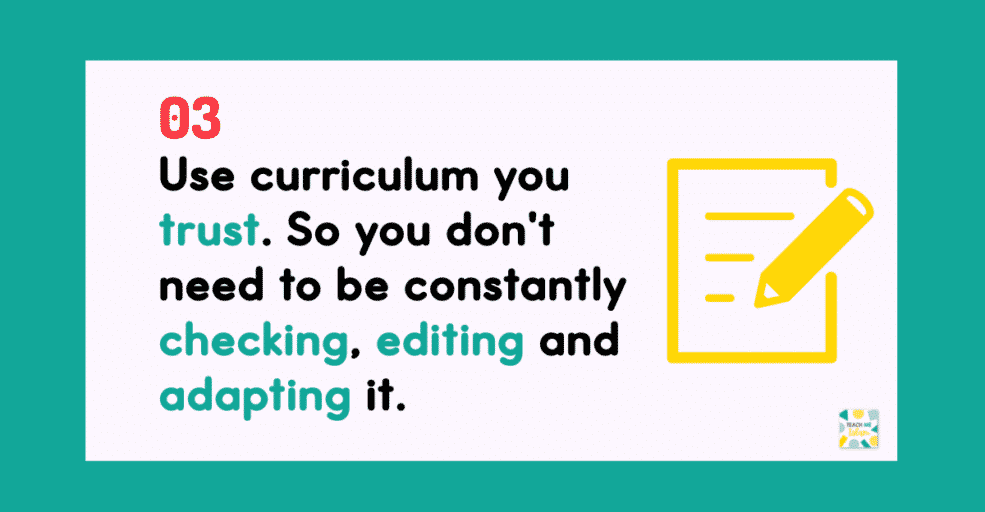
Use curriculum you trust. Save time by not constantly checking, editing, and adapting it.
It’s common to find a beneficial scheme of work, only to discover unislamic elements littering the pages. Music, magic, mysticism, religious holidays and practices, immorality are just some of the common features of material designed for children. Plus editing the pictures to make them appropriate to print out, takes time that could be better spent elsewhere. If you use a curriculum designed by conscientious Muslims, you can just open and teach without having to skip, check and edit.
Homeschool queens have great unit studies that can be found here
Um Assad has an amazing blog that generously includes many free printables.
Salaam Homeschooling has beautiful free resources that can be found here.
May Allah bless them all and reward them generously for their contribution to the Muslim homeschool community.

Break topics into bitesize chunks for a productive Muslim homeschool
Any subject matter can feel overwhelming when it is viewed as a whole. If you break topics down into very small sections, it feels manageable, for both you and your kids. When we teach Qur’an, we teach ayat by ayat at first. It’s inspiring to think even those who memorized the entire Qur’an started that way, with a single ayat.
The manners of eating can be broken down into saying bismillah, eating with your right hand, eating from what is in front of you, not blowing on food, leaving food you dislike, not criticising food, and saying alhamdulillah after you eat. All of these manners can be overwhelming when they are taught all at once. However, learning and practicing them one at a time feels achievable and therefore your Muslim homeschool is much more likely to be successful inshaAllah.
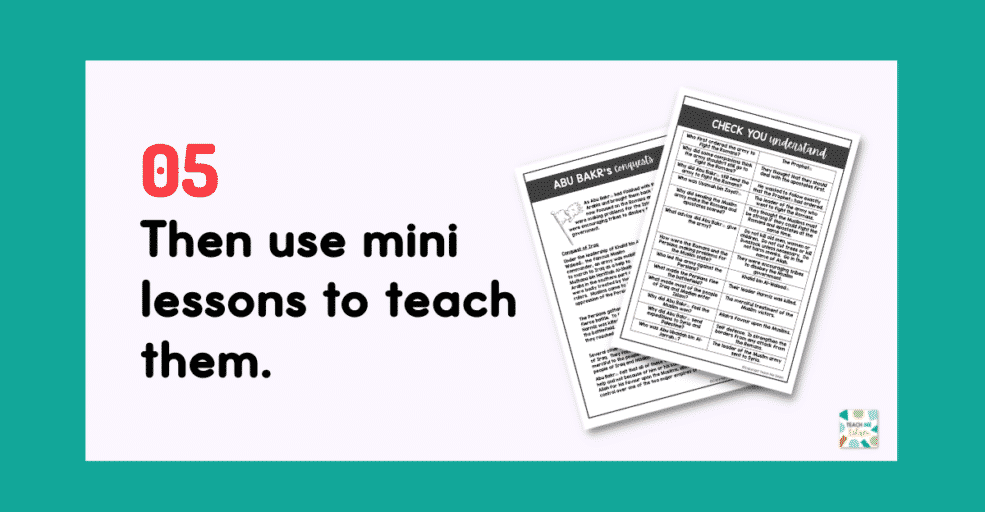
Use mini-lessons to teach topics
Mini-lessons are used in classrooms to instruct children, often in small groups. Mini-lessons are short, focused lessons that last a short period of time, around 10 minutes. They focus on essentials and are delivered in a way that is clear and concise.
They begin with the purpose of the lesson and why it is important. Next, teach using modeling and examples. Check for understanding using questions or very short exercises that are completed together. Finally, give them an exercise to practice the skill or apply what they have learnt.
These are such a valuable tool in homeschools because they are very focused. The 4 step formula keeps you as a teacher on track. Plus you can vary the student exercise at the end to meet your own needs.
The format of the Abu Bakr Unit Study is a series of mini-lessons. The biography is broken down into many small sections. There are “check your understanding” questions and answers for each section.
An example mini-lesson could therefore be structured as follows:
Objective: Learn about Abu Bakr’s conversion to Islam.
Teach: Read the page aloud.
Check: Ask the review questions.
Exercise: Retell how Abu Bakr (may Allah be pleased with him) became Muslim.
I hope you found this blog about how to create a more productive Muslim homeschool useful. You can find links below for related posts. May Allah bless your homeschool and grant your success!
Here are some other blog posts you may be interested in:
7 surprising ways they teach Islamic Studies in Muslim countries
What are Islamic Comprehension Passages and why you should be using them

